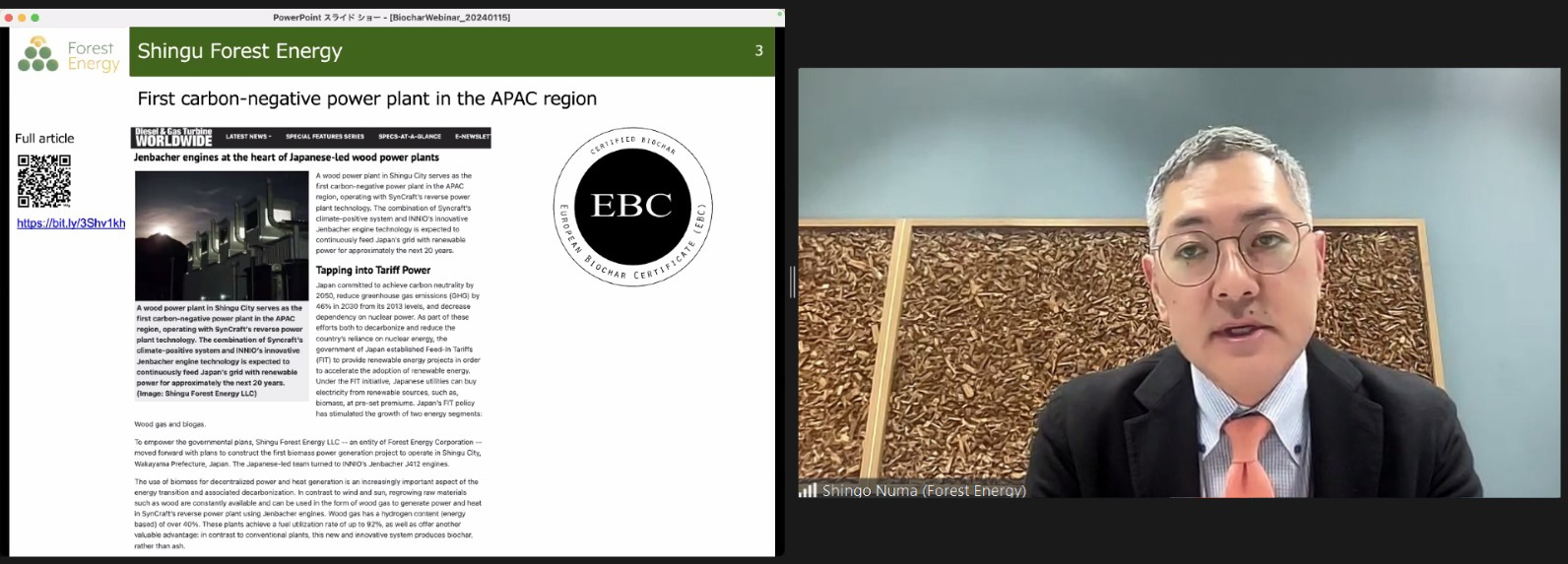Menu

Under the Cleaner Energy Future Initiative for ASEAN (CEFIA), a programme funded by the Ministry of Economy, Trade and Industry (METI) of Japan, the ASEAN Centre for Energy (ACE) alongside Boston Consulting Group (BCG) of Japan as the CEFIA secretariat, hosted a webinar on “Biochar Technologies” on 15 January 2024.
The CEFIA programme supports the region’s energy transition and decarbonisation through three key pillars: decarbonising technologies, institutional arrangements, and finance. CEFIA’s flagship projects encompass diverse areas, including Zero Energy Building, RENKEI, SteelEcosol, Finance, and a Healthy and Energy Efficient AC System. Recognising the exceptional potential of biochar in both carbon sequestration and clean energy solutions, CEFIA has chosen it as a key focus area for decarbonisation technologies. This webinar falls under the biochar flagship initiative, highlighting its ongoing exploration and development.
The webinar, attended by 130 participants from governmental institutions, the academic community, private companies, and NGOs, explained how biochar technologies can be used and their benefits for a carbon-neutral society. The webinar lasted 2 hours and included three Japanese companies, a diverse team of experts and biochar technology practitioners presenting their knowledge on the matter.
Following the presentation, the possibility of their application to the ASEAN countries will be discussed in the panel discussion, offering a platform for exploring the latest technological advancements in decarbonisation efforts. The webinar commenced with opening remarks from Haruna Yoshizawa, a representative of METI. Yoshizawa underscored the purpose and benefits of establishing CEFIA, emphasising its potential to assist the ASEAN region in its transition towards a carbon-neutral society.
This webinar delivered a visionary case of using biochar for carbon neutrality within the power, agriculture, and construction sectors, showcasing promising initiatives with impactful potential for application in the AMS. Shingo Numa, CEO of Forest Energy Inc., set the stage with his presentation entitled Production of Biochar as a By-Product of Energy Utilisation. This was followed by Numa, who explained the benefits of biochar as an energy source and carbon reduction for power generation. He also provided valuable insights into the understanding of Biochar and the innovative approach to utilise it for carbon sequestration.

Photo 1. Shingo Numa from Forest Energy Inc., during his presentation
Furthermore, Shogo Okishio, Overseas Business Development at TOWING Co., Ltd., presented the best practice of high-performance biochar solution. He focused on its potential to drive agricultural decarbonisation and reduce chemical fertiliser reliance, paving the way for a more sustainable ecosystem. He emphasised the significant opportunities for implementing this technology within the ASEAN region, fostering the potential for carbon-negative agricultural practices. Following that, Shinya Yamamoto, from the Center for Social System Engineering at Shimizu Corporation, presented on his company’s innovative method for carbon sequestration: Incorporating Biochar into Concrete. Yamamoto highlighted the development of a pioneering concrete mixture containing biochar – specifically sourced from sawmill sawdust, a readily available by-product. This biochar-enhanced concrete demonstrably maintains the performance of its conventional counterpart while achieving a 96% reduction in CO2 emissions.

Photo 2. Shogo Okishio from TOWING Co., Ltd. during his presentation

Photo 3. Shinya Yamamoto from Shimizu Corporation, during his presentation
The final session was explained in an interactive panel discussion between the three presenters, focusing on two crucial questions regarding the advantages and challenges of implementing biomass technologies and biochar products in the ASEAN region. The discussion was insightful, with each presenter offering their perspectives. They highlighted the significant potential of biomass energy in ASEAN, citing the region’s abundant biomass resources. They emphasised how biochar adoption could pave the way for sustainable development, contributing to environmental and economic benefits. However, the discussion also acknowledged the challenges that need to be addressed. They pointed out the incompatibility of current EU-designed biochar gasification technologies with the tropical-density woods of the ASEAN region. Additionally, the steep cost of existing biochar technologies was identified as a major obstacle to widespread adoption.
The webinar is closed with a closing remark from Septia Buntara Supendi, representative of ACE, who highlighted the projected significant surge in ASEAN’s energy demand. He then emphasised the promising potential of the presented biochar initiative for reducing energy consumption and optimising the utilisation of local materials and resources. He also hoped that this webinar would offer valuable insights and that the best practices shared today would serve as a powerful catalyst for government and private sector action toward carbon neutrality.
